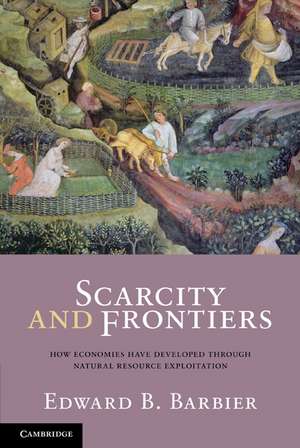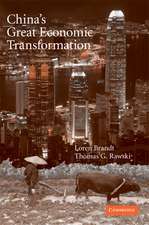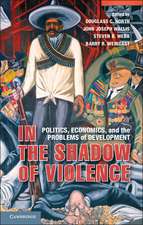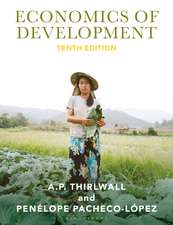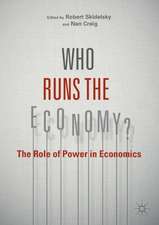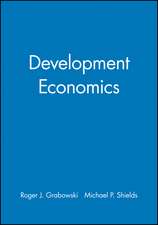Scarcity and Frontiers: How Economies Have Developed Through Natural Resource Exploitation
Autor Edward B. Barbieren Limba Engleză Paperback – 22 dec 2010
| Toate formatele și edițiile | Preț | Express |
|---|---|---|
| Paperback (1) | 313.12 lei 3-5 săpt. | |
| Cambridge University Press – 22 dec 2010 | 313.12 lei 3-5 săpt. | |
| Hardback (1) | 748.30 lei 6-8 săpt. | |
| Cambridge University Press – 22 dec 2010 | 748.30 lei 6-8 săpt. |
Preț: 313.12 lei
Nou
Puncte Express: 470
Preț estimativ în valută:
59.92€ • 62.68$ • 49.77£
59.92€ • 62.68$ • 49.77£
Carte disponibilă
Livrare economică 12-26 martie
Preluare comenzi: 021 569.72.76
Specificații
ISBN-13: 9780521701655
ISBN-10: 0521701651
Pagini: 768
Ilustrații: 46 b/w illus. 42 tables
Dimensiuni: 153 x 229 x 34 mm
Greutate: 1.2 kg
Editura: Cambridge University Press
Colecția Cambridge University Press
Locul publicării:Cambridge, United Kingdom
ISBN-10: 0521701651
Pagini: 768
Ilustrații: 46 b/w illus. 42 tables
Dimensiuni: 153 x 229 x 34 mm
Greutate: 1.2 kg
Editura: Cambridge University Press
Colecția Cambridge University Press
Locul publicării:Cambridge, United Kingdom
Cuprins
List of figures; List of tables; List of boxes; Preface; Acknowledgements; 1. Introduction: scarcity and frontiers; 2. The agricultural transition (from 10,000 BC to 3000 BC); 3. The rise of cities (from 3000 BC to 1000 AD); 4. The emergence of the world economy (from 1000 to 1500); 5. Global frontiers and the rise of Western Europe (from 1500 to 1914); 6. The Atlantic economy triangular trade (from 1500 to 1860); 7. The golden age of resource-based development (from 1870 to 1914); 8. The age of dislocation (from 1914 to 1950); 9. The contemporary era (from 1950 to present); 10. Epilogue: the age of ecological scarcity?; Index.
Recenzii
'In his masterly and timely book, Ed Barbier rescues the resource endowment from its surprisingly passive role in development economics. He details the succession of natural resources which Bagehot's 'conquering swarm' of humanity has used to fuel its expansion. The pointers in the past from which a world of ecological scarcity may learn are fully revealed in this encyclopaedic study.' Eric L. Jones, author of The European Miracle (2003) and Growth Recurring (2000)
'Wide-ranging in time (from 10,000 BC to the present day) and space (with case studies drawn from many parts of the world), this is a major and path-breaking analysis of the role of natural resources and the expansion of populations into new frontiers in shaping the evolution of economic and social changes. Based upon extremely wide reading and a detailed knowledge of the issues, this book adds to our understanding of past events while providing suggestions for handling today's resource and climate problems.' Stanley L. Engerman, University of Rochester
'In this tour de force, Ed Barbier brings to bear the full weight of history on economics' age-old question about the significance of natural resource endowments for economic performance. Proceeding from the Paleolithic to the present, Barbier tests the ideas of natural-resource economics against the record of our species' efforts to make use of our environment. Economists, historians, and especially economic historians will learn from and admire this book for decades to come.' John R. McNeill, University of Georgetown
'Edward Barbier's interpretation of the economic history of nations, seen through the lens of natural resource exploitation, is not only bold but brilliantly executed. The scholarship is immense and the analysis is acute. This is a terrific piece of work.' Sir Partha Dasgupta, University of Cambridge
'Ed Barbier's new book, Scarcity and Frontiers: How Economies Have Evolved through Natural Resource Exploitation, is vast in scope and remarkable in the breadth and depth of knowledge brought to bear on its central thesis - that the exploitation of natural resources and the expansion of frontiers in response to natural resource scarcity have been pivotal forces in the evolution of civilizations. Tracing long spans of pre-industrial history, Barbier demonstrates how expansion into unoccupied frontier areas provided the agricultural surpluses and natural resource raw materials needed to fuel economic growth in emerging civilizations. Particularly instructive are his comparisons between the fates of once powerful empires that failed to secure access to natural resource materials beyond their borders, and suffered economic stagnation and eventual decline as a consequence once their frontiers were closed, and the experience of western Europe, whose superior institutions of commerce and mastery of the seas enabled the exploitation of frontiers and natural resources globally and led to economic ascendancy during the age of exploration. Barbier's aim in writing this book is no less sweeping in scope, to help present day civilizations learn from these experiences and better understand how to cope with the coming age of ecological resource scarcity. He has produced an indispensable contribution in pursuit of that goal.' Robert T. Deacon, University of California, Santa Barbara
'Ed Barbier has expanded his interest in problems of scarcity and marginalization in contemporary societies to a broadly based look at frontiers in a very long historical context, charting the interaction of economic growth and the resource frontier from the origins of settled agriculture to current concerns over the sustainability of expanding resource exploitation.' Knick Harley, Oxford University
'This book provides an ambitious re-interpretation of world economic history based on the notion of the frontier. Rather than a feature of US exceptionalism frontier expansion becomes central to explaining comparative historical development. This is a powerful and thought provoking work.' James Robinson, Harvard University
'Wide-ranging in time (from 10,000 BC to the present day) and space (with case studies drawn from many parts of the world), this is a major and path-breaking analysis of the role of natural resources and the expansion of populations into new frontiers in shaping the evolution of economic and social changes. Based upon extremely wide reading and a detailed knowledge of the issues, this book adds to our understanding of past events while providing suggestions for handling today's resource and climate problems.' Stanley L. Engerman, University of Rochester
'In this tour de force, Ed Barbier brings to bear the full weight of history on economics' age-old question about the significance of natural resource endowments for economic performance. Proceeding from the Paleolithic to the present, Barbier tests the ideas of natural-resource economics against the record of our species' efforts to make use of our environment. Economists, historians, and especially economic historians will learn from and admire this book for decades to come.' John R. McNeill, University of Georgetown
'Edward Barbier's interpretation of the economic history of nations, seen through the lens of natural resource exploitation, is not only bold but brilliantly executed. The scholarship is immense and the analysis is acute. This is a terrific piece of work.' Sir Partha Dasgupta, University of Cambridge
'Ed Barbier's new book, Scarcity and Frontiers: How Economies Have Evolved through Natural Resource Exploitation, is vast in scope and remarkable in the breadth and depth of knowledge brought to bear on its central thesis - that the exploitation of natural resources and the expansion of frontiers in response to natural resource scarcity have been pivotal forces in the evolution of civilizations. Tracing long spans of pre-industrial history, Barbier demonstrates how expansion into unoccupied frontier areas provided the agricultural surpluses and natural resource raw materials needed to fuel economic growth in emerging civilizations. Particularly instructive are his comparisons between the fates of once powerful empires that failed to secure access to natural resource materials beyond their borders, and suffered economic stagnation and eventual decline as a consequence once their frontiers were closed, and the experience of western Europe, whose superior institutions of commerce and mastery of the seas enabled the exploitation of frontiers and natural resources globally and led to economic ascendancy during the age of exploration. Barbier's aim in writing this book is no less sweeping in scope, to help present day civilizations learn from these experiences and better understand how to cope with the coming age of ecological resource scarcity. He has produced an indispensable contribution in pursuit of that goal.' Robert T. Deacon, University of California, Santa Barbara
'Ed Barbier has expanded his interest in problems of scarcity and marginalization in contemporary societies to a broadly based look at frontiers in a very long historical context, charting the interaction of economic growth and the resource frontier from the origins of settled agriculture to current concerns over the sustainability of expanding resource exploitation.' Knick Harley, Oxford University
'This book provides an ambitious re-interpretation of world economic history based on the notion of the frontier. Rather than a feature of US exceptionalism frontier expansion becomes central to explaining comparative historical development. This is a powerful and thought provoking work.' James Robinson, Harvard University
Notă biografică
Descriere
A fascinating account of the contribution that natural resource exploitation has made to economic development in world history.
